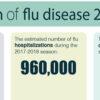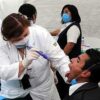
JOINT RELEASE: Increase in Flu Hospitalizations, Deaths in Eastern Washington, Northern Idaho Prompts Officials to Urge More Vaccinations
For more information, contact Kim Papich, SRHD Public Information Officer (509) 324-1539 or kpapich@srhd.org
Consult with healthcare provider if ill; masking recommendations issued
SPOKANE, Wash. – Spokane Regional Health District (SRHD) and Panhandle Health District (PHD) recently saw an increase in influenza (flu) hospitalizations and deaths, prompting hospital and public health officials to issue this reminder to get vaccinated. It is recommended that all people 6 months of age and older get immunized against flu. The vaccine promotes antibody protection within two weeks.
If a person does become ill, individuals should consult with a healthcare provider to determine the best place to go for a diagnosis.
Said SRHD Health Officer, Dr. Bob Lutz, “When it comes to flu and seeking care from a healthcare provider, those people at higher risk of complications should call and consult with their provider when ill.” Continued Dr. Lutz, “While most people who do become ill with flu can be safely cared for at home, there are some symptoms, like trouble breathing, that should trigger immediate emergency care.”
This season, 89 individuals have been hospitalized in Spokane County with laboratory-confirmed flu. Six influenza deaths have been reported in Washington state—four of which are attributed to Spokane County. In Northern Idaho, hospitalizations increased as influenza positivity rates rose 18 percent over the past two weeks. Two Northern Idaho deaths are attributed to flu this season.
Said Dr. Lutz, “While patient conditions are sometimes critical enough to necessitate a trip to the emergency department, you may find that after consulting with a healthcare provider, they may recommend you visit an urgent care or express clinic instead, which are good options to consider.”
For the convenience of individuals in Eastern Washington, both MultiCare and Providence Health Care offer many urgent care and express clinics. For a complete listing of MultiCare Urgent Care locations, including the newly introduced MultiCare Indigo Urgent Care, click here. For a listing of Providence Urgent Care and Express Care clinics, click here.
“Urgent care and express care facilities help to unclog emergency departments, which are meant for the sickest of the sick,” said Dr. David Chen, chief medical officer for MultiCare Deaconess and Valley hospitals. “Patients should feel comfortable seeking treatment at urgent care facilities, which provide quality care close to home.”
“Perhaps one of the main benefits of urgent cares and express care clinics is the fact that they are so easily accessible and frequently have no or short wait times, so patients can be seen in the most convenient setting,” said Peg Currie, chief operating officer at Providence Health Care. “In addition, providers at these clinics will direct patients to an emergency department if necessary.”
These clinics also offer flu vaccinations. According to Centers for Disease Control and Prevention (CDC), while vaccine effectiveness can vary, recent studies show that flu vaccination reduces the risk of flu illness by between 40% and 60% during seasons when most circulating flu viruses are well-matched to the flu vaccine. Flu vaccination may also reduce flu illness severity, meaning that while someone who is vaccinated may still get infected, their illness may be milder.
The increase in hospitalizations and deaths also prompted SRHD to recommend that all healthcare workers either receive their annual influenza vaccination or wear a mask during the remainder of flu season, which MultiCare, Providence Health Care and many other Eastern Washington providers implemented with staff this week. Additionally, to protect patients, some hospitals are putting visitor restrictions into effect for the rest of flu season. To see MultiCare’s restrictions, visit its website here.
Flu viruses spread when people with flu expel droplets from their mouths or noses while coughing, sneezing or talking. People who have the flu often feel some or all of these symptoms:
- Fever or chills
- Cough
- Sore throat
- Runny or stuffy nose
- Muscle or body aches
- Headaches
- Extreme fatigue (very tired)
Sick individuals should also talk to their providers about possible treatment with antiviral drugs.
When treatment is started within two days of becoming sick with flu symptoms, antiviral drugs can lessen fever and symptoms and shorten the time people are sick by about one day. They also may reduce the risk of complications.
People can also get flu by touching a surface or object that has flu virus on it and then touching their own mouth, eyes or nose. In addition to flu vaccination, officials also recommend frequent hand washing with warm water and soap, covering coughs and sneezes and staying home if sick.
For more information about influenza and influenza vaccine visit SRHD, PHD, MultiCare, or Providence Health Care sites. Spokane Regional Health District’s website also offers comprehensive, updated information about Spokane Regional Health District and its triumphs in making Spokane a safer and healthier community. Become a fan of SRHD on Facebook to receive local safety and wellness tips. People can also follow the health district on Twitter @spokanehealth.
###


